Boiled beets are allowed for children from the first year of life. In addition to the undoubted health benefits, a number of other advantages can be highlighted: it is tasty, inexpensive, stores well, and you can cook many different dishes with it. Read more about the valuable properties and possible harm of beets in this article.
Many children do not like boiled beets, but love vegetable cutlets, salads, and soups. Even the most picky little one will surely appreciate a light soup - beetroot soup. It is no less loved by children of all ages than traditional okroshka.
You can prepare beetroot soup for a child starting from the first year, if the baby is healthy, feels well and is already familiar with all the components of this complex dish. For kids, it is better to replace sour cream in the recipe with natural yogurt. It is recommended to season children's food with sour cream from 2–2.5 years of age.
Beneficial features
Beetroot is a root vegetable that can be stored for a long time, practically without losing its beneficial properties. During the cold season, it becomes an accessible source of substances necessary for the body.
For children 1 year of age and older, beetroot dishes are healthy due to the high content of insoluble dietary fiber and pectin. Coarse fiber stimulates intestinal contractions and also creates an environment beneficial for beneficial microflora - this helps prevent and treat constipation and dysbiosis.
Due to the predominance of pectin over insoluble fiber, beet dishes have a laxative effect, but do not provoke abdominal pain and increased gas formation. Pectin helps the gastrointestinal tract cleanse itself of toxins, heavy metal salts, etc.
Beets are rich in ascorbic acid, B vitamins, PP, and contain a set of micro- and macroelements, including iron and iodine, which contribute to the proper development of a child in 1 year of life. Regular consumption of dishes from this root vegetable is useful for the prevention and treatment of iodine deficiency, anemia, and hypovitaminosis.
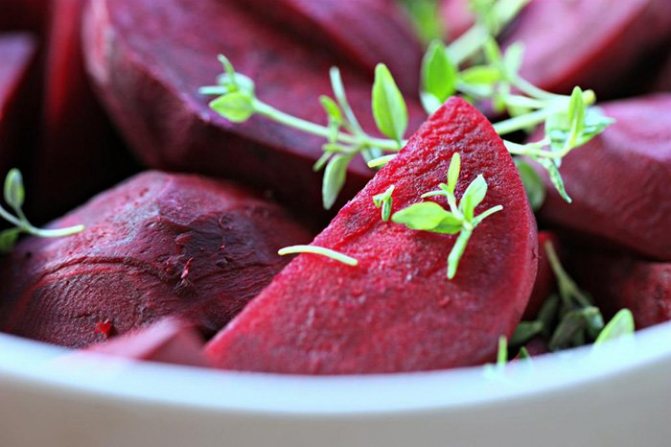
Beets owe their bright color to their high content of betaine, a biologically active substance that is necessary for a number of processes in the body, including the metabolism of fats and proteins. In addition, betaine protects the baby's liver.
The use of beet juice for constipation in infants
The younger the child, the more carefully any medication must be selected, since all possible side effects must be taken into account.
This also applies to remedies used for stool retention - both pharmaceutical and folk.
Read the article about whether beetroot juice helps a newborn with constipation, how effective it is and whether you should count on its safety for the health of a small patient.
Young children who are breastfed may not recover for several days - and still feel fine. The absence of feces in itself is not an indication for starting treatment. You should be concerned if signs such as:
- lethargy;
- restlessness, moodiness;
- crying while straining;
- decreased or lack of appetite;
- colic;
- flatulence.
Not only the retention of stool, but also the passage of lumpy, dense stool should give rise to the idea of constipation.
It is expelled from the rectum sparingly, over a long period of straining, often together with gases.
FAQ (Frequently Asked Questions)
Beetroot juice is one of the most famous folk remedies designed to relieve constipation. Its undoubted advantages are naturalness, low cost and availability of ingredients.
The medicine can be easily prepared in your own kitchen with confidence that no harmful impurities or unnecessary components have been added to it.
But you need to figure out what results to expect from use and how useful the vegetable is in the fight against stool retention.
How does beet juice affect the intestines?
Many people note a pronounced laxative effect: it is enough to drink one portion of the product to soon feel a strong urge to have a bowel movement. When visiting the toilet, the intestines are quickly cleared of feces.
What is the secret of beetroot medicine? The composition contains components that stimulate peristalsis; In addition, fresh juice irritates the mucous membrane of the digestive tract and triggers a number of physiological processes.
Because of this, nausea, heaviness in the stomach and vomiting may occur, and sometimes cramps and colic in the abdomen are observed.
However, both beneficial and unpleasant effects usually do not last long, and beets have no therapeutic effect at all.
Is there a risk of diarrhea when consumed?
The product can actually cause diarrhea. This happens if:
- the patient has an individual sensitivity to the juice;
- a poor-quality (for example, rotten) vegetable was selected;
- the root crop was poorly washed before extracting the juice, and fragments of soil and tops got into the glass;
- beets are grown using chemicals and irritants;
- other components that affect the intestines have been added to the medicine;
- the amount of product has been exceeded.
It is not always possible to predict the severity of side effects, so it is recommended to take into account the risk and not use beetroot medicine in patients prone to allergic reactions and suffering from diarrhea.
Is it possible to give beet juice to a baby for constipation?
Currently, pediatricians do not recommend using this remedy for newborns. The reactions that children may have to it are unpredictable.
There is a possibility of stool disorder, which will, of course, lead to the cessation of constipation, but not an improvement in the patient’s condition.
Abdominal pain and bloating often intensify instead of disappearing, and vomiting appears - and this is completely the opposite of the expected result.
At the same time, many families of the older generation have considerable experience in using beet juice in infants for constipation.
In some cases, this drug is well tolerated, but it is worth considering that several decades ago there was no impressive range of drugs with a mild effect. And the risk can hardly be justified by the potential, but not guaranteed, benefit.
Thus, giving beetroot juice to infants is not recommended.
Features of application
Treatment of children for constipation should begin with finding out the cause of stool retention. Recipes based on vegetables, in particular, beet juice, are a symptomatic remedy; it does not improve the condition of the intestines even if it is well tolerated. But if you decide to use it, you should know what rules to follow.
Choosing beets
The root crop should be fresh, not too large and free from traces of foulbrood and insect damage.
It is worth purchasing only those specimens whose chemical safety you are confident of, since there is a risk of encountering vegetables cultivated under conditions of pesticide treatment.
An adult may not feel the effects of toxins if they are contained in small quantities, but a newborn child is at risk.
Of course, it is better to give preference to vegetables grown in an environmentally friendly manner. Such options can be found in specialty stores. Another way out is to use root vegetables from your own plot.
Recipe 1
To make beet juice suitable for relieving constipation, you need:
- Wash the root crop, thoroughly clearing it of soil and removing the tops.
- Prepare warm boiled water.
- Cut a small piece of beetroot.
- To peel.
- Pour boiling water over it.
- Squeeze the juice into a clean container.
- Strain through sterile gauze.
You need to dilute the juice with boiled water so that you get a teaspoon. Give the child a drink and monitor his condition. If bowel movements or signs of bloating or restlessness occur, the dose should not be repeated. Sometimes they start with a few drops of a diluted product. This makes it easier to check portability.
Recipe 2
To improve the effect of the folk remedy, combine carrot and beet juices. Required:
- select high-quality fresh root vegetables;
- wash them, remove remaining soil and tops;
- to peel;
- pour boiling water over;
- cut off a small piece;
- squeeze out the juice;
- strain through sterile gauze.
The juices should be mixed in a 1:1 ratio, and then diluted by half with boiled water to make a teaspoon of the product. Give it warm to your child, but not hot or cold. Monitor his well-being. Do not repeat the dose if diarrhea begins, flatulence increases, or there are signs of anxiety and colic.
Harmful properties of root vegetables
How dangerous are beet dishes for a child? Pediatricians recommend treating this root vegetable with caution because:
- beets actively absorb nitrates from the soil, and if you use unsafe vegetables from your garden to prepare complementary foods, your baby may receive serious poisoning from harmful substances;
- root juice can cause allergies;
- the laxative effect can result in diarrhea in a newborn, since his gastrointestinal tract is not yet ready to digest such food.
Fresh beet juice is contraindicated for children in the first years of life. It contains a high concentration of fruit acids, which will cause the newborn to irritate the sensitive walls of the stomach and intestines. Freshly squeezed juice does not undergo heat treatment, which is why it may contain large quantities of nitrates.
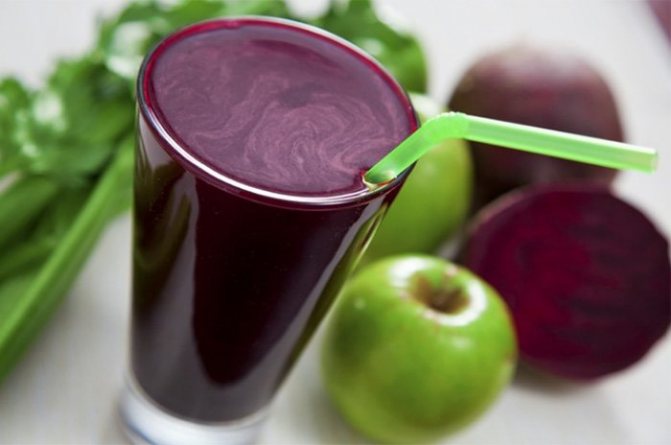
For children over 1 year of age who are prone to constipation, pediatricians prescribe diluted beetroot juice, limiting the daily volume of the drink - no more than 60 ml is allowed.
To eliminate the risk of nitrate poisoning, root vegetables should be selected and prepared correctly.
The effect of beet juice on constipation in infants
Article last updated: 02/13/2019
Constipation in newborns is a fairly common problem. In this case, the process of defecation is delayed, the baby constantly cries, kicks his legs and tries to pull them to the chest. In this case, a characteristic strong tummy is observed.
There are a number of main reasons that can cause constipation in babies:
- disrupted diet of the nursing mother herself;
- early introduction of complementary foods;
- lack of fluid in artificial babies;
- various diseases of the body that can contribute to the appearance of constipation (rickets, disruption of the normal functioning of the thyroid gland).
Do not try to treat newborn babies yourself! Only a highly qualified pediatrician can determine the presence of constipation in a child and correctly prescribe the necessary medications. Self-treatment can only worsen the child’s general condition or lead to irreparable consequences for his health.
At what age should beet complementary foods be introduced?
Beetroot dishes can be added to the baby’s menu when he reaches eight months of age. By this time, his body has already been adapted to digest coarse fiber and pectin, which are contained in apples, potatoes, zucchini and other foods recommended for first feeding.
For the first time, the baby is given boiled beet puree. Half a teaspoon of this puree is added to the puree of other vegetables, preferably potatoes. The baby still has to get used to the taste of beets in their pure form; they may not like it right away.
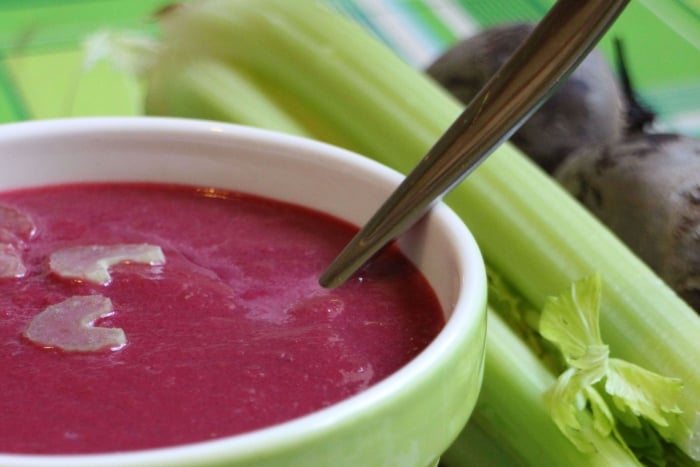
You should experiment with adding beetroot puree to your baby’s usual food in the first half of the day to observe how the baby’s body reacts to the new product. Within two days the following may occur:
- allergic manifestations (redness of mucous membranes, skin rashes);
- indigestion (loose stools);
- abdominal pain (colic, bloating).
These symptoms are a signal to postpone the introduction of beetroot dishes into the diet until the baby is 1 year old or later. During this time, the child’s digestive system will become stronger and the production of necessary enzymes will improve.
If a child under the age of 8 months has difficulties with bowel movements, has weak peristalsis and is tormented by constipation, it is allowed to give beetroot puree from 5-6 months in agreement with the pediatrician.
In a situation where a six-month or one-year-old baby often suffers from diarrhea or intestinal colic, it is advisable not to rush with complementary foods that include beets.

For eight-month-old babies, whose body has successfully coped with the first portion of beets, the serving volume is increased in a few steps to five teaspoons per day, adding half a spoon each time. Puree is given twice a week if the child does not have a tendency to constipation. If you have problems with bowel movements, you can serve dishes with beets more often. From the age of one, a daily serving of beetroot puree of 12 teaspoons is allowed.
Beetroot juice for newborns with constipation: influence and possibility of use
› Child under one year old › Diseases
Author of the article
Ekaterina Rakitina Doctor Dietrich Bonhoeffer Klinikum, Germany
Reading time: 4 minutes
AA
Article last updated: 02/13/2019
Constipation in newborns is a fairly common problem. In this case, the process of defecation is delayed, the baby constantly cries, kicks his legs and tries to pull them to the chest. In this case, a characteristic strong tummy is observed. There are a number of main reasons that can cause constipation in babies:
- disrupted diet of the nursing mother herself;
- early introduction of complementary foods;
- lack of fluid in artificial babies;
- various diseases of the body that can contribute to the appearance of constipation (rickets, disruption of the normal functioning of the thyroid gland).
Do not try to treat newborn babies yourself! Only a highly qualified pediatrician can determine the presence of constipation in a child and correctly prescribe the necessary medications. Self-treatment can only worsen the child’s general condition or lead to irreparable consequences for his health.
Beetroot juice for constipation - the benefits and harms of treatment with this method
Beetroot juice can quite effectively replace various drugs from the pharmacy that are prescribed to newborns for constipation.
You just need to know the correct method of using it! Hippocrates also prescribed beet juice for many diseases, and its treatment has largely received modern medical confirmation.
Many clinical experiments prove that this juice improves blood composition by causing the production of red blood cells, and betaine promotes normal growth development.
Beetroot juice perfectly stimulates the intestines, and therefore its use to treat constipation in children will bring undoubted benefits. Beetroot juice has excellent laxative properties and cleanses the body of harmful toxins and heavy metals. But you should pay attention to the fact that it has contraindications!
Beetroot juice is an excellent source of iron and iodine, which improve blood composition, increase hemoglobin levels, stimulate the functionality of the thyroid gland and improve memory. The minerals found in abundance in this root vegetable are also beneficial. Magnesium, potassium and sodium will help the body get rid of cholesterol and calcium.
Botanical description
Carrots belong to the Apiaceae family because their inflorescence actually resembles an umbrella. Yet this biennial herbaceous plant is much better known for its root vegetable.
On the surface it is crowned with curly tops, consisting of pinnately dissected leaves, and roots extend deep into the ground, sometimes reaching a depth of 2 m, but most often resting at a depth of 0.6 m. Its weight ranges from 0.025 kg to over 0.5 kg.
The root vegetable, most often of a radical orange color, is covered with a thin skin, near which and in it itself the maximum nutrients are concentrated.
Contraindications for taking beets to treat constipation
Children suffering from diarrhea should not drink beet juice! This will only worsen the situation and lead to rapid dehydration of the baby’s body.
It is also worth remembering that beets increase the acidity of the stomach, so it is not recommended to consume them in large quantities. Excessive consumption can lead to burns of the mucous membranes of the stomach and intestines in infants, the formation of gastritis or peptic ulcers. You should definitely consult your pediatrician about the required amount of beets for your baby.
The acids and sugars in beet juice can cause children's pancreas and liver to secrete large amounts of enzymes, which can negatively affect the children's health.
After taking beets, the irritated mucous membranes of the body become extremely susceptible to various microorganisms and infections. Therefore, quite often infants develop thrush in their mouths.
Beetroot juice contains very little fiber, but a large amount of sugar and various acids.
This composition has a strong irritation of the intestinal mucosa, which undoubtedly helps to cope with constipation.
But at the same time, along with the process of defecation, there is a rapid removal of fluid, beneficial vitamins and minerals. It is important not to overdo it with beets, so as not to deprive your baby of vital substances.
What to do in an emergency if it is impossible to get to the pediatrician?! In order to alleviate the child’s condition, you should give him no more than 1 teaspoon of diluted beet juice.
How to get rid of constipation at home
Many people face the problem of prolonged stool retention or difficulties during bowel movements, but in this case, home remedies that do not have any side effects on the body successfully cope with the ailment.
Such a healing effect can be produced by various vegetable oils, herbs, as well as the inclusion in the diet of a number of products that help cope with constipation: bran, some dried fruits, cereals, dairy products, juices and honey.
A certain mechanical effect can alleviate a person’s condition and help avoid the consequences of prolonged stagnation of excrement in the body - these are special enemas and abdominal massage.
A somewhat unconventional way to get rid of constipation - soap, despite its effectiveness, can pose a health threat, especially when it comes to young patients, so this method must be carefully studied before use.
Various oils are considered the main remedy for solving stool problems.
Their effectiveness is explained by the fact that they can have a laxative effect, act as an intestinal lubricant and stimulate choleretic processes, which also help eliminate constipation.
To eliminate the disease, Vaseline, castor, flaxseed, sunflower, olive, sea buckthorn and pumpkin oils are used, each of which in its own way solves the problem of defecation retention.
Vaseline oil for constipation successfully copes with the task of removing feces. The therapeutic effect is achieved thanks to the characteristics of this substance, otherwise called liquid paraffin.
It is extracted from petroleum, therefore it is considered a natural, environmentally friendly, but non-herbal remedy, non-toxic, non-carcinogenic and mutagenic, and, after consultation with a doctor, can be used even in infants.
Chemical stability of petroleum jelly
Source
How to give beet juice to a newborn
Beetroot juice for the treatment of constipation should be used with caution, carefully following the preparation recipe. It is best to use a mixture of vegetables, rather than just pure beets.
This will help the newborn get rid of constipation at the same time and will not deprive him of a significant dose of nutrients.
The optimal solution would be to prepare a vegetable mix using beets (0.350 kg), apples (0.400 kg), carrots (0.400 kg).
To prepare beet juice, it is also important to choose the right root vegetable. It should be of medium size, regular solid shape and should not contain old white veins. Ideal beets have a dark cherry color.
You should absolutely not give freshly prepared beet juice to your baby right away! It must stand for 2 hours so that dangerous and aggressive essential substances have time to leave it. After this, you should dilute it in half with boiled water, carrot and apple juice. A light decoction of rosehip branches and berries is also perfect.
You should start feeding your newborn with a few drops. If over the next couple of hours there are no manifestations of an allergic reaction, then you can safely gradually increase the dose to 2 teaspoons per day.
https://www.youtube.com/watch?v=TV8Y9ysaCIQ
Decide for yourself whether or not to give your baby water! You can also use various drugs to combat constipation in newborns, which are available in abundance at any pharmacy. The ideal solution would be to go to the pediatrician, who should definitely tell you everything. It would be even better if you consult several specialists in different hospitals on this issue.
We wish good health to all children and peace of mind to their mothers!
Non-standard remedy for runny nose for children: beet juice
Source: https://bugmk.ru/narodnoe/svekla-novorozhdennomu-ot-zapora.html
How to choose and prepare root vegetables
It is important to take care of the safety of the product for the baby’s health, especially if we are talking about a child of 1 year of age. Dishes should be prepared from root vegetables from your own plot or purchased from people you know well who grow crops for themselves.
If you have to buy beets in a store or market, use a nitrate meter. If you don’t have a device at hand, use the following tips:
- choose small root vegetables - they do not have time to absorb a large amount of nitrates;
- root vegetables should be dense, without dark spots of rot and mold (this indicates improper storage);
- When cut, the root vegetable should have a dark burgundy color, without distinct light veins - this means that the nitrate content is minimal.
Without heat treatment, beets are not only dangerous due to nitrates, but also greatly irritate the digestive organs due to the high concentration of fruit acids. To get rid of the negative properties of the root vegetable and reduce the risk of allergies, it is boiled.
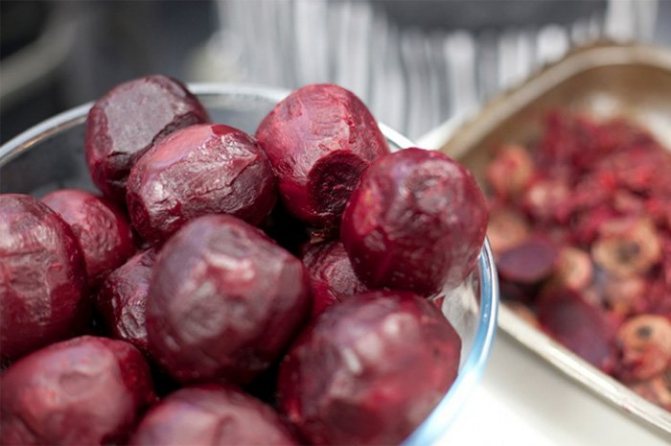
When cooking beets, some of the vitamins are destroyed, but at the same time:
- betaine, coarse fiber and pectin, magnesium, iron and other beneficial substances are preserved;
- nitrates almost completely go into the water;
- the content of fruit acids decreases.
To properly cook beets, you need:
- cut off the top part of a small root crop - this is where the bulk of the nitrates accumulate;
- immerse it in boiling, non-salted water (the vegetable cooks longer in salted water; in addition, complementary foods for babies are not added with salt);
- after 35-40 minutes of cooking, remove the root vegetable from the boiling broth using a slotted spoon and place it in cold water for 20 minutes (if possible, add ice to it).
This cooking method allows you to reduce the cooking time in order to retain more vitamins in the vegetable, while the product will become soft.
Beetroot dishes for children
Children are given beets only in combination with other products, so as not to provoke gastrointestinal irritation. In a dish prepared for a child, beets should account for no more than 30% of the total volume.
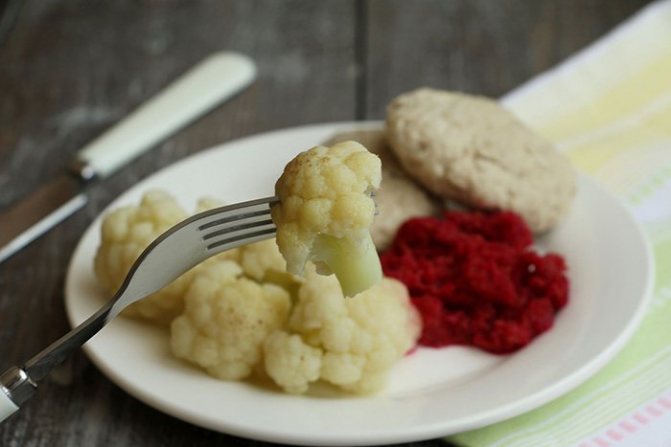
This vegetable is mixed with pureed cabbage, pumpkin, potatoes, zucchini or zucchini. If desired, add lean minced meat or chicken. Manufacturers offer meat and vegetable purees for baby food, which include beets.
Starting from the age of one year, the menu of beet dishes is expanded, introducing:
- salads, including vinaigrette;
- vegetable pancakes or cutlets;
- stew;
- casseroles;
- soups (borscht, children's beetroot soup).
Please note that multi-component dishes are prepared only from those products that the baby’s body has managed to get used to. Preference should be given to boiled, steamed or baked dishes. It is important to limit the amount of salt and choose spices that are safe for the baby (dry dill, parsley).
Beets are included in many dishes recommended for a healthy diet.
Its effect on the body is therapeutic and regulates the child’s digestion process. Subscribe to our VKontakte group








